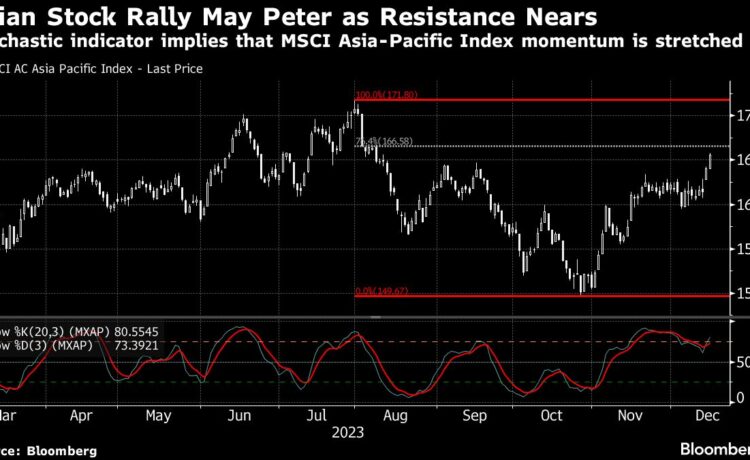(Bloomberg) — Asian stocks are set for a weaker open after US shares ended a six day rally as Federal Reserve officials pushed back against bets of aggressive interest rate cuts next year.
Most Read from Bloomberg
Australian shares fell in early trading while equity futures in Japan and Hong Kong pointed to losses. Contracts on US stocks were little changed in early Asia trading after the tech-heavy Nasdaq 100 index closed at a record high Friday. The dollar was mixed against major peers following gains in its last session after New York Fed President John Williams said it’s too early for officials to begin thinking about lowering borrowing costs.
The pushback may start to scupper the ‘everything rally’ after traders took previous Fed signals as a green light to ratchet up bets on rate cuts next year, helping US and Asian shares to their biggest weekly gains in a month. Swaps traders trimmed bets on cuts in 2024 to just under five from six prior to the interview, according to data compiled by Bloomberg.
“The S&P 500 has rallied more than 10% in less than two months so some digestion of the rally is needed,” Tom Essaye, the founder of The Sevens Report newsletter, wrote. That “likely will come in the near term, especially if Fed officials rhetorically push back on the market’s enthusiasm in the next week or two.”
Even with Williams tamping down some of the market’s ebullience, the Fed’s tone last week was more dovish than that of European peers. European Central Bank Governing Council member Madis Muller said Friday that markets are getting ahead of themselves in betting of rate cuts in the first half of next year while ECB President Christine Lagarde said the bank had not discussed rate cuts at all.
“It was the week before Christmas and all was quiet in financial markets… until the central bankers started talking and investors reverted from the notion that interest rates will have to stay ‘higher for longer’,” Bancorp wrote in a note to clients.
Read More: Fed’s Goolsbee Says Too Early to Declare Victory Over Inflation
The Final Holdout
Attention will soon shift to Japan with the nation’s central bank beginning a two-day policy meeting Monday. While speculation has grown the Bank of Japan will soon end the world’s last negative-rate regime, economists see April as the most likely timing for a change, with around 15% expecting Ueda to pull the plug on negative rates in January, according to a Bloomberg survey of more than 50 economists.
“The BOJ has little need to rush into making policy changes,” Societe General economists led by Wei Yao wrote in a note. “But markets will be watching for any sign the board is willing to end negative rates or yield curve control.”
Read More: BOJ Is Said to See Little Need to End Minus Rate Next Week
Markets will also digest a cabinet reshuffle by Japanese Prime Minister Fumio Kishida after he ousted four lawmakers accused of concealing income generated from fund-raising events. The scandal has rocked the ruling Liberal Democratic Party and fueled speculation it may consider changing its leader before his term ends in September.
Elsewhere this week, the Reserve Bank of Australia will release its minutes from the December policy meeting while Bank Indonesia will make its final policy decision of the year. Traders will also be keeping a close eye on developments in the Middle East as Israel pushes back against calls for a ceasefire in Gaza, and escalating attacks on merchant ships in the Red Sea.
In commodities, Brent crude’s slide of more than 20% from its September peak suggests inflation is set to slow even further in developing nations in coming months. Emerging-market currencies are also poised to gain as finances of net-oil importers improve. Meanwhile, gold slipped by as much as 0.8% Friday, trimming a weekly gain.
Chile rejected the second proposal for a new constitution in as many years at the weekend, highlighting the failure of the nation’s political system to channel social demands into a new set of basic laws. The result, broadly in line with recent polls, means that the current charter dating from the Augusto Pinochet dictatorship will remain in place.
Key events this week:
-
ECB holds biennial conference on fiscal policy and EMU governance, Monday
-
Pro-democracy media tycoon Jimmy Lai heads to court in Hong Kong, Monday
-
Nasdaq 100 index annual reconstitution, Monday
-
RBA Dec. policy meeting minutes, Tuesday
-
Bank of Japan decision, Tuesday
-
Canada inflation, Tuesday
-
Eurozone inflation, Tuesday
-
Atlanta Fed President Raphael Bostic speaks, Tuesday
-
New Zealand issues half-year economic and fiscal update, Wednesday
-
China loan prime rates, Wednesday
-
UK inflation, Wednesday
-
Bank Indonesia rate decision, Thursday
-
US GDP, Thursday
-
Nike earnings, Thursday
-
Japan inflation, Friday
-
UK GDP, Friday
Some of the main moves in markets:
Stocks
-
S&P 500 futures were little changed as of 8:27 a.m. Tokyo time. The S&P 500 was little changed on Friday
-
Nasdaq 100 futures were little changed. The Nasdaq 100 rose 0.5%
-
Hang Seng futures fell 0.8%
-
Australia’s S&P/ASX 200 fell 0.4%
Currencies
-
The Bloomberg Dollar Spot Index rose 0.4%
-
The euro was unchanged at $1.0895
-
The Japanese yen was little changed at 142.23 per dollar
-
The offshore yuan was little changed at 7.1326 per dollar
-
The Australian dollar was little changed at $0.6696
Bonds
Cryptocurrencies
-
Bitcoin fell 0.8% to $41,558.17
-
Ether fell 1.4% to $2,206.31
Commodities
-
West Texas Intermediate crude rose 0.9% to $72.04 a barrel
-
Spot gold fell 0.8% to $2,019.62 an ounce
This story was produced with the assistance of Bloomberg Automation.
–With assistance from Michael G. Wilson.
Most Read from Bloomberg Businessweek
©2023 Bloomberg L.P.













